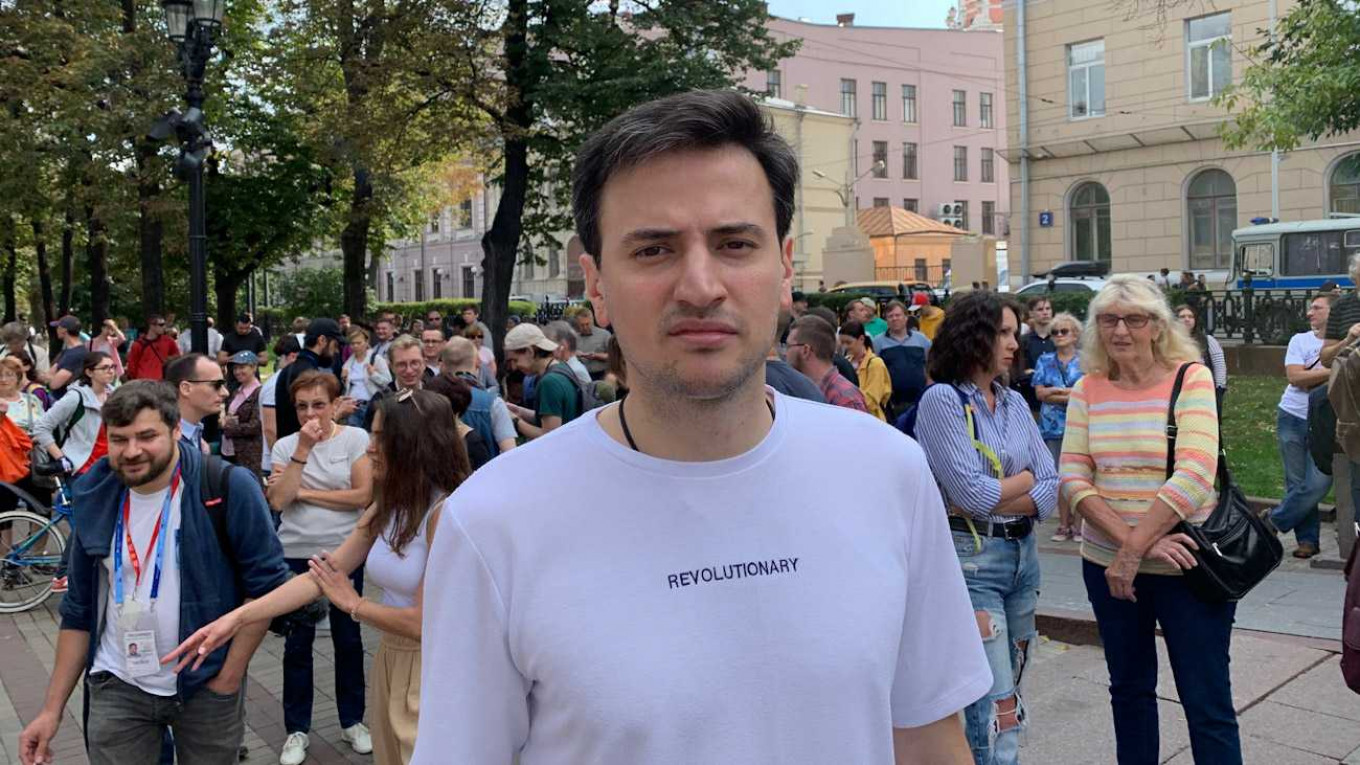On the last official day of summer in Russia, several thousand people in Moscow turned out for what has become the flavor of the season: the Saturday protest.
But the turnout was lower and the mood subdued compared with previous demonstrations in this year’s summer of discontent, which saw as many as 50,000 people at a single rally on the streets of the Russian capital and more than 2,900 detained.
Up to 2,000 people marched Saturday afternoon in a gathering that was not approved by the authorities, sporadically breaking into the familiar chants “Russia without Putin” and “Freedom to political prisoners.”
Moscow police, who estimated the number of marchers at around 750, took a different tack from previous unauthorized demonstrations this summer. They did not detain a single protester — not even Lyubov Sobol, an ally of Russia’s most prominent opposition leader Alexei Navalny and the de facto face of the protests for fair elections that began on July 14. Police had detained Sobol at the start of the previous two unauthorized rallies.
“Thanks to everyone who took part in a peaceful march today in the center of Moscow against political repression and the barring of independent candidates from elections!” Sobol wrote on Twitter after the protest was over. “Become an observer in the elections, participate in ‘Smart Voting’ and do not be afraid! We will win!”

The reference to ‘Smart Voting’ — Navalny’s plan for strategic voting in next weekend’s elections — is partly the reason for what has appeared to be a sudden downturn in the protests’ momentum. Over recent weeks, Navalny has pushed for the tactic, which aims to sweep the ruling United Russia party out of office, to take prominence over street protests.
“We must stop endlessly counting people at rallies and remember the goal for which this all began,” the opposition leader wrote in a blog post earlier this month. “We do not need to hold the largest rally — although if it happens that’s great — but to defeat the party in power in these elections.”
Navalny, who said that he did not attend Saturday’s protest to avoid another arrest before next weekend’s election, wrote the blog post in prison while serving a 30-day sentence for calling people to join unauthorized demonstrations. Although he had only participated in two rallies, he was swept up in a crackdown on protest organizers that has hampered their ability to continue mobilizing demonstrators.
The organizers were mostly opposition candidates who had been barred from running in the Sept. 8 city council elections, nearly all of whom have spent a considerable amount of time in prison for rallying the protests, while some remain behind bars. On the morning of Saturday’s protest, Yulia Galyamina, one of the candidates, was released after 35 days in jail.
She did not attend the protest, but Alexander Solovyov, another candidate who had spent time in prison last month and is affiliated with exiled oligarch Mikhail Khodorkovsky’s pro-democracy Open Russia political movement, did. Wearing a T-shirt with “revolutionary” printed across the chest, he told The Moscow Times at the scene of the protests that it was important to keep fighting in the face of the crackdown no matter the risks.
“I’m scared I’ll get arrested again, but what can I do?” he said. “We all have to come out to support the students facing the worst.”
After the Investigative Committee opened a criminal case into “mass unrest” over the protests last month, more than just protest organizers have been caught up in the authorities’ dragnet. At least 14 people face up to eight years behind bars, including three students.
On Saturday morning, police searched the apartment of one of those students, Yegor Zhukov, 21. As protesters marched on Saturday afternoon, the Novaya Gazeta newspaper published a letter he wrote from jail.
“Wanting to intimidate society, the authorities only make it more angry,” Zhukov wrote. “In trying to reduce protests with the help of fabricated cases, they only increase them.”
Meanwhile at the protest, Natalia, a 40-year-old engineer who declined to give her last name for fear of retribution, said she was attending only the second protest in her life. The first was on Aug. 10, a rally approved by city officials that brought out 50,000 people — the largest opposition-led protest since the 2011-2012 protests against Vladimir Putin’s rule.
The rally, which took place only a few days before Navalny called for a focus on Smart Voting, was also the last opposition-led protest till Saturday. Natalia said she hopes the focus on street protesting returns after next weekend’s election.
“I believe we should be coming out to the streets until all of the authorities are behind bars,” she said.
